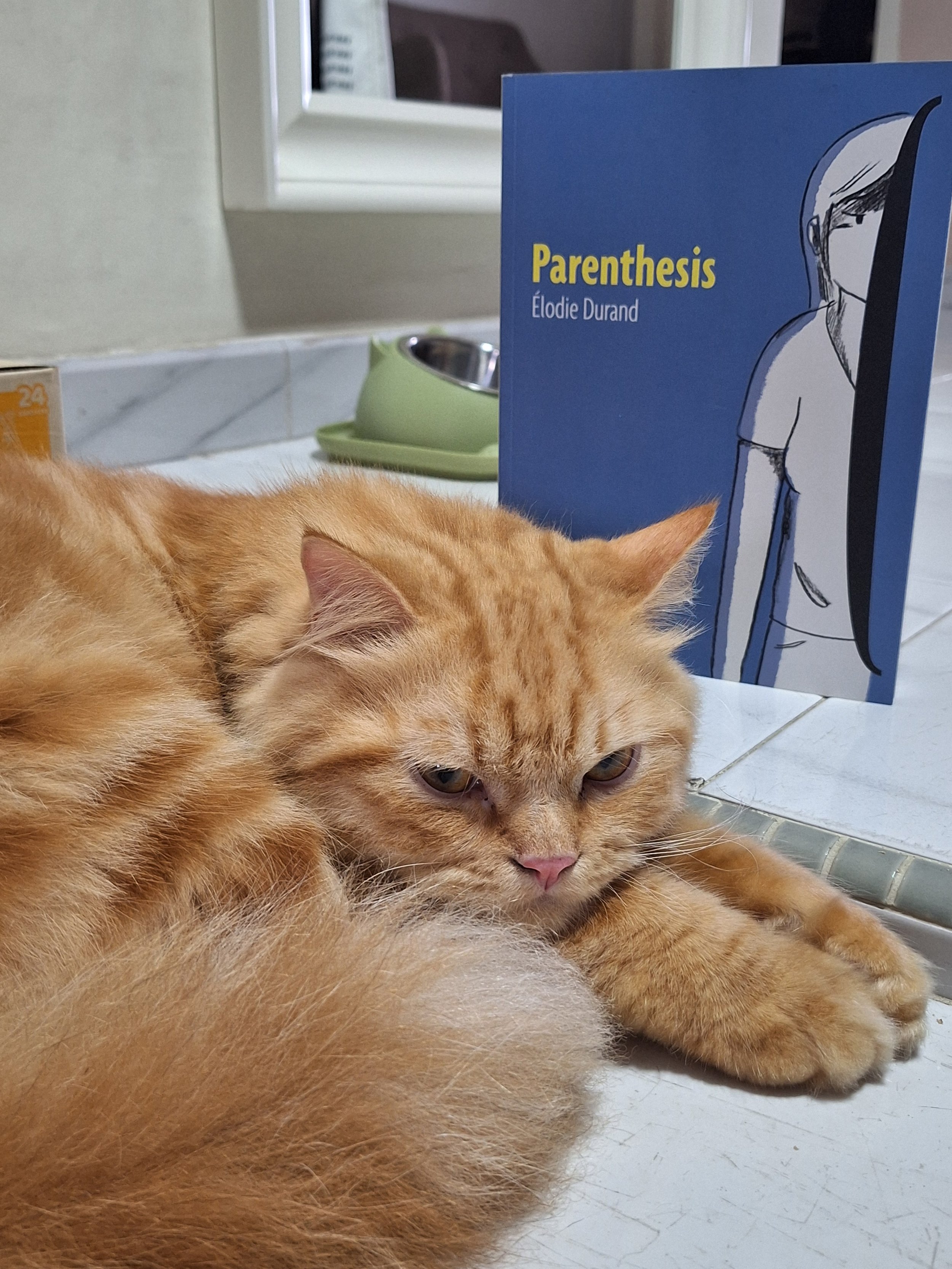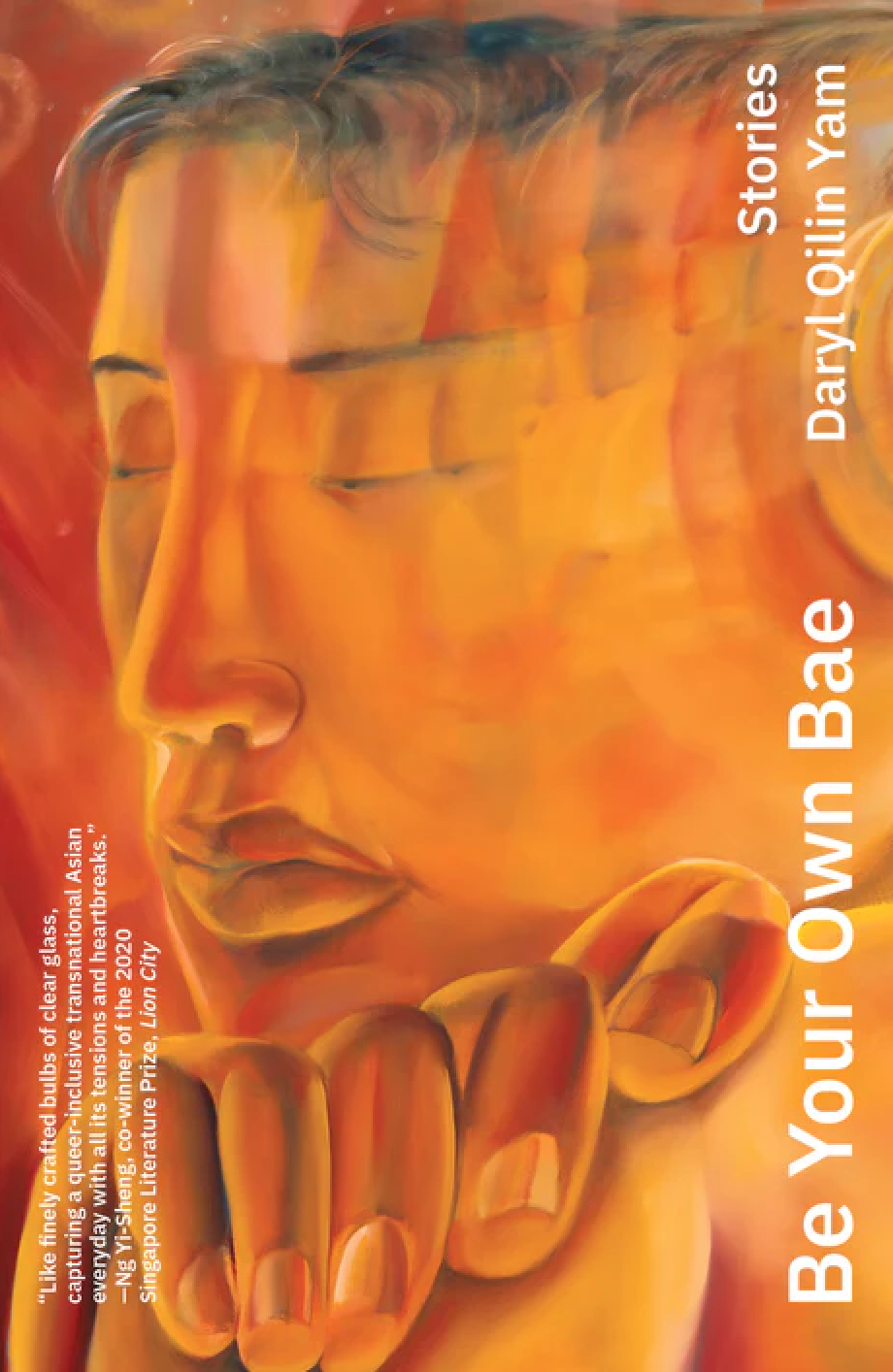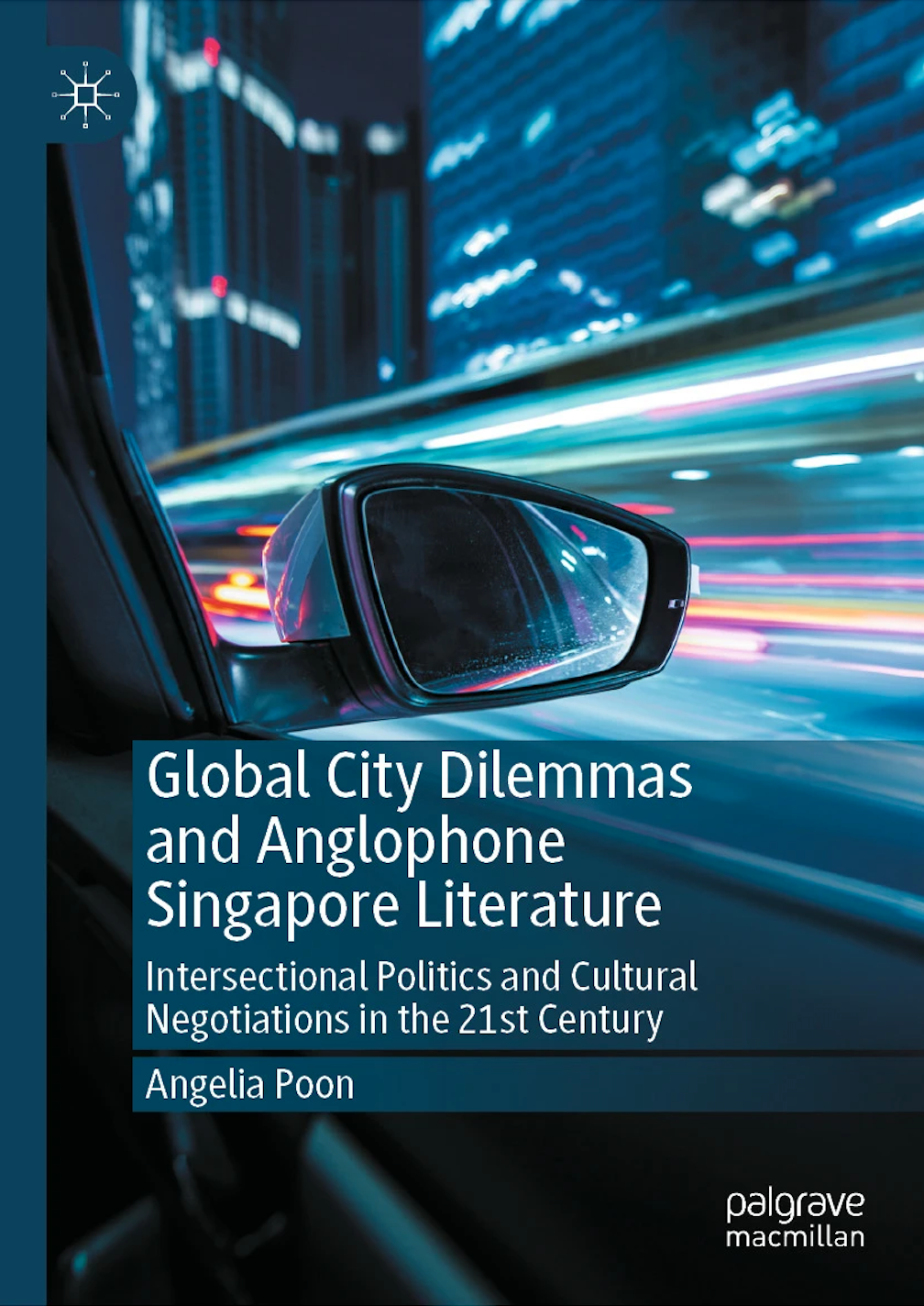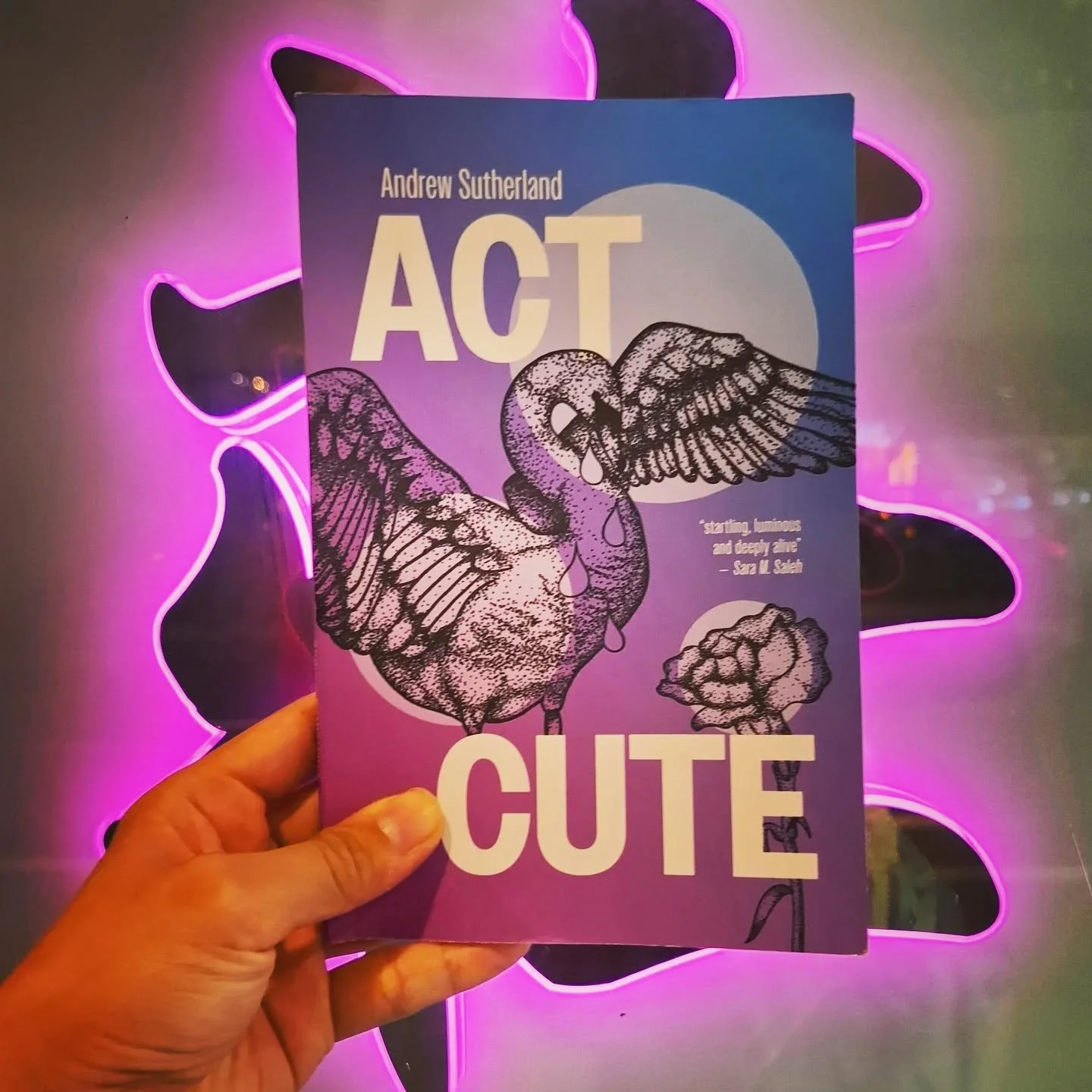A New Picaro
By Lara Norgaard
Review of Migrantik by Norman Wilwayco, translated from the Filipino by Peter Dominique Mutuc (Singapore: Penguin, 2022)
Susie Ang - Crossing the Border (2021), Digital
Image description: Three individuals walk forward in a line, towards the right side of the image. The first two individuals have their heads lowered. In the middle ground, behind the three figures, are high fences consisting of straight, thin lines stretched across four tall columns. The background is a dull-purple sky with low, pink clouds.
Tony arrived at the Ninoy Aquino International Airport in Manila in what could be described as an informal motorcade that doubled as a club on wheels. His family was the security detail, flanking him to ensure he got on the plane. They were also the party, taking shots on the drive to the airport and saying tearful goodbyes. Tony was going to Sydney against his will, sent to support his family through remittances. He didn’t have much of a say in the situation. His family needed money, and there were no real prospects in Manila.
Still, Tony had one last trick up his sleeve: he planted a bullet in his carry-on. He was caught in security, of course—but he claimed that an airport employee had slipped the slug in his bag to get a bribe. Hand over $1,000 AUD and an upgraded first-class ticket, he told the airline manager, or he’d make a call to GMA News about an airline that extorted money from innocent overseas Filipino workers. The scam worked—except for the fact that Tony’s budget airline didn’t have first class. He’d be riding economy, but at least with an envelope full of cold, not-so-hard-won cash.
Migrantik, the 2022 novel written by Norman Wilwayco and translated from the Filipino by Peter Dominique Mutuc, follows the frustrated and debauched journey that Tony takes from Manila to Sydney and back again. Wilwayco grew up between Cebu, Mindanao, and Manila in the Philippines, and received the Grand Prize for Literature in the Carlos Palanca Memorial Awards for his first two novels, Mondomanila and Gerilya. He now lives in Sydney, where he’s a renaissance man of odd jobs, working as an e-learning developer while dabbling in everything from toy making to carpentry to undertaking to graphic design and commenting on pop culture and current events on his Facebook page. Migrantik is Wilwayco’s first novel set in Australia, though it would be more accurate to call the novel a story torn between a distant life in the Philippines—the “land of durian and extrajudicial killings”—and the straitjacket of a nine-to-five job in a nondescript Sydney office building.
The novel’s dive into Tony’s experience as an overseas worker is reminiscent of the irreverence and grit in Karla Cornejo Villavicencio’s The Undocumented Americans. It offers a foil to the stereotypical representations of a stoic, innocent, hardworking immigrant or overseas worker. Migrantik recasts the lived realities of transnational labor markets and the anxieties of a migrant’s exile in prose that staunchly resists any pretensions of piety. Tony is the anti-hero of a picaresque journey through Sydney’s unforgiving urban landscape and through his own memories of home.
Wilwayco’s use of perpetual anti-climax is one of the novel’s most striking and effective elements. The plot revolves between Sydney and Manila: Tony is found out for squatting and has to find a new place to live; a huge typhoon rages over Metro Manila; his daughter gets robbed, deepening tensions between Tony and his ex; Duterte’s drug war claims a victim close to home. But as time passes, and in the face of both minor and exceptional struggles, Tony finds that his daily existence changes little. Unmoored in a foreign country, barely making ends meet, lacking any real community, watching his daughter’s life through selfies, he feels as if his life is on hold.
Indeed, the structuring force of the book lies in the tension between monotonous repetition (rolling a fat joint before work, scrolling through Facebook, the homogeneous schedule of a work week, drunken weekends) and brief sparks of exceptional events. The reader who expects striking change, who hopes for drama and redemption, will be disappointed, since whatever growth Tony undergoes as a person, it happens quietly and too late. The protagonist finds out his brother back in Manila is gay, for example, and his knee-jerk reaction is homophobic denial, communicated over a painful Skype call. Tony eventually comes to terms with his brother’s identity, but only after his brother is already dead, gunned down by the police in a drug raid. The apology, a moment of real character development, is contained in a Facebook message that will never be opened or read.
The episodes that do end in drama and confrontation tend to be more absurd than heartfelt, and they create a mood of both humor and uncanny tension. A fist fight breaks out when a Turkish boy, who rents a room in the house Tony moves into after losing his squatting rights, finds out that Tony used the empty TV box he’d left out in the yard as material for a bonfire, thereby ruining the TV’s resale value. Another physical altercation takes place when Tony is sent to get burgers for the other workers in the office—most of whom are also foreign—and comes back one order short. If the first brawl loosened our protagonist’s two front teeth, the second sent burgers and sandwiches flying across a boardroom right as a client was walking through the door. The underworld in Sydney is one of relentless precarity, and every character who traverses it is on edge, ready to snap, since even the most seemingly innocuous conflict always has real material consequences.
Susie Ang - Long Distance Relationship (2020), Digital
Image description: Against a dark background, the large, blue silhouette of a human figure stands in front of a red rectangle. On the silhouette itself, a second, smaller individual is rendered in dark-blue; she appears to be walking next to blue waves, with the moon in the background—this image is entirely contained within the former silhouette.
Tony as a character is generally unlikeable. He abuses drugs and alcohol, and he’s sexist (loves his daughter and mother but objectifies everyone else) and often racist (mostly towards Chinese and Sri Lankan migrants, though he’s prone to stereotyping any and all nationalities even as he himself is frequently the target of racist discrimination). Amidst these unpleasant qualities, Wilwayco still incorporates small hints of redemption: Tony is a talented web designer, he never forgets his family’s requests even as he waltzes on the precipice of despair, and he’s an avid reader, having grown up in a house with heaps of books and no TV.
He’s also a vigilante anti-troll who, despite his distance from events on the ground, feels deeply responsible for his country’s political future: “Didn’t get much sleep last night because I was posting campaign shit for the coming election back home in my beloved motherland. The Duterte trolls are in full force at Facebook. Someone needs to push them back, so the serious candidates have at least a chance of winning. So it won’t just be Duterte’s lap dogs getting elected into office.”
One might read Tony as a new take on the classic picaresque protagonist. He’s a rogue figure from society’s lower classes, an amoral yet surprisingly appealing alternative to the knight in shining armor. His sardonic attitude sheds light on the corruption and hypocrisies of mainstream society.
In addition to crafting his modern-day picaro, Wilwayco also explores toxic masculinity and exposes racial tensions and anti-Chinese sentiment that really do run through the Philippines and across diasporas. However, Tony’s objectification of women and racial stereotypes—and occasional slurs—that punctuate nearly every chapter of the novel raise questions about the lines that fiction can or should cross. When does replicating the more harmful elements of those discourses become gratuitous?
The novel’s narrative voice too often slips from brash but meaningful reflections on a hedonistic lifestyle into flippant remarks that seem to serve little purpose for characterization or narrative. Even simple references to his exploits with women appear as an unnecessary adornment to his more motivated desire to abuse drugs and alcohol as a way to forget the heavy problems weighing on him:
At that exact moment, the DJ decides that it’s time to up the tempo. And our feet drag us to the dance floor to begin the all-night ritual of dance. And all my problems, the shit at home, work shit, women shit, family shit, shit about relatives who love to borrow money and never pay it back, all the shit in the world is ejected from my brain. … An hour passes and I’m making out with one chick. And then it’s on to the other one. Then back to the first one. And so on and so forth. Harry is doing the same with the two chicks.
The final three lines fail to move the passage in new directions. Most women pass in and out of the story unnamed, unimportant, entirely flat from Tony’s vantage point. Marooned as we are in the male protagonist’s subjectivity, it’s often difficult to discern if Wilwayco’s harsh realism is revelatory or excessive.
A stiffness in Peter Dominique Mutuc’s translation also exacerbates a reader’s sense of discomfort. Much of the dialogue reads as too formal for a casual conversation. Take the following exchange between Tony and a Scottish work friend named Harry on a night out with the men from the office:
“Brothels are not really my shit,” he [Harry] says.
“Me too,” I answer, “but what can we do?”
I’ve reached my sexual quota as well, having fucked that chick in the pub.
The lack of a contraction in the first line (“Brothels are not really my shit” instead of “Brothels aren’t my shit”) makes the dialogue feel strangely written. Tony’s thoughts similarly read as less than convincing (“I’ve reached my sexual quota as well” could be rendered more organically as “Plus, I’d hit my sexual quota”). These seemingly innocuous translation choices build over the course of the book and create an artificial distance between reader and narrator, making it even harder to connect with a challenging protagonist.
That said, Migrantik is not an easy book to translate and presents exciting language puzzles that Mutuc plays with in compelling ways. The story is multilingual and multinational, as characters from almost a dozen countries speak with strong accents and slang. This is a narrative built on code-switching, incomprehension, and mistranslations (sometimes literally, as when an Indonesian staff misunderstands the English text Tony asks them to publish on a new webpage, resulting in a banner with a peaceful tropical image and a headline that reads, Is the two Chinese peeps walking on the beach, much to the chagrin of the client). In his translation of dialogue, Mutuc often keeps expressions in the Filipino and then adds a contextual gloss in parentheses—for instance, when Tony says, “Tangina ka ang sarap mong sakalin,” the translator adds: “(Son of a whore. Strangling you would please me).” The parenthetical intervention is very effective, as it allows the English-language reader to perceive both layers of the dialogue: the incomprehension on the part of Tony’s English-speaking interlocutor and the meaning of what Tony is trying to say, which readers of the original Filipino text would immediately understand. Although the solution is inventive, the literal gloss loses the idiomatic feel of Tony’s speech, once again maintaining the wall between the reader and the character. “Son of a whore. Strangling you would please me” could be rendered more idiomatically as son of a bitch, I could just strangle you.
Readers who embrace the strangeness of Migrantik as a contemporary reimagining of the picaresque novel in the world of overseas labor and Facebook posts are in for a thought-provoking journey. Wilwayco explores the distance between Sydney and Manila, the limbo of a constant wait to return, the gap that separates any two languages, and the unforgiving, desolate lack of solidarity and connection between those who occupy similar positions of precarity. Yet, even in its darkest moments, Wilwayco’s story maintains a certain pride in being Filipino. Drawing lessons from José Rizal’s 1887 anti-colonial classic Noli Me Tangere, the protagonist of Migrantik confronts a world that perpetually stands against him and, in the process, unveils the social problems that undergird daily interactions. Of course, Tony himself phrases what he’s learned a little more simply: “like Rizal said, no good comes from dealing with motherfuckers.”
Susie Ang - Desiring Freedom (2023), Digital
Image description: White grids—thinner in the background and thicker in the foreground—are rendered against a dark background. A towering, white column, with thin black lines resembling wires, stands in the center of the image. Beneath the column are vaguely-rendered, human figures, standing closely together. Their faces turn away from us. The side profile of the central figure is partly lit up.
Lara Norgaard is a literary critic and translator of Indonesian, Portuguese, and Spanish into English. Her essays and translations have appeared in many publications, including Asymptote, Public Books, The Jakarta Post, and the Cuíer anthology of LGBTQ+ Brazilian literature (Two Lines Press, 2021). She is a 2021 PEN/Heim Translation Fund Grants recipient for her translation of the Indonesian novel 24 Hours with Gaspar, by Sabda Armandio (Seagull Books, 2023). Currently, she is a PhD student in comparative literature at Harvard University, where she researches post-dictatorship Latin American and Indonesian fiction.
*
Susie Ang is an illustrator based in Singapore. Her artistic approach is often a mix of conceptual and intuitive process. As crayons were her first love, she also enjoys exploring colors and moods. Her works have been recognized by Creative Quarterly, 3X3, Communication Arts, American Illustration, and more. You may see more of her works at www.susieang.com
If you’ve enjoyed reading this article, please consider making a donation. Your donation goes towards paying our contributors and a modest stipend to our editors. Singapore Unbound is powered by volunteers, and we depend on individual supporters. To maintain our independence, we do not seek or accept direct funding from any government.












In Taiwan Travelogue, ‘twinned souls… are at once lost, but also found, in translation.’ A review by Eunice Lim.